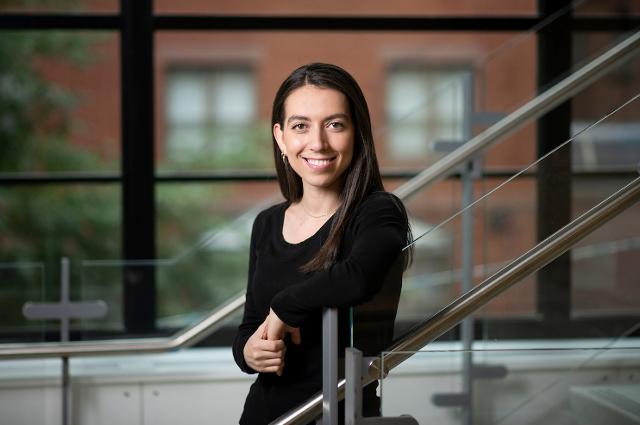-
About
-
Academics
- Physician Assistant
- Special Master’s (MBS)
-
Admissions & Financial Aid
- Tuition & Fees
-
Student Life
-
Research
- Research Labs & Centers
-
Local & Global Engagement
- Global Health Program
Kick-Starting a Career in Neuroscience Research
Thanks to Tufts’ Post-Baccalaureate Research Program, Sofia Corella is searching for predictive biomarkers for post-traumatic epilepsy

When she went to college, Sofia Corella—who came to the U.S. with her family from Costa Rica when she was seven years old—majored in psychology and got her first taste of research. It turned out to dovetail with an interest in medical science sparked by caring for her grandmother when she was young.
Hoping to do a Ph.D. program in science, she is now taking part in the Post-Baccalaureate Research Program (PREP) at Tufts Graduate School of Biomedical Sciences. The program offers research training for recent college graduates interested in pursuing research careers in the biomedical sciences.
Tufts PREP trainees can conduct up to two years of research work in a field of their choosing, in which they are mentored by faculty members, and participate in classes, workshops, and seminars.
They receive a stipend, health benefits, and tuition through the program, which is funded in part by a grant from the National Institute of Health’s National Institute of General Medical Sciences, designed to increase the number of people from groups currently underrepresented in biomedical science research.
Corella works in the lab of Chris Dulla, an associate professor of neuroscience at the School of Medicine who studies glutamate, an excitatory neurotransmitter, and its role in signaling in the brain, especially as it relates to epilepsy and traumatic brain injury.
Tufts Now recently spoke with Corella to learn more about her research, and how the PREP program is helping her achieve her goal of pursuing a PhD.
Department:
Neuroscience